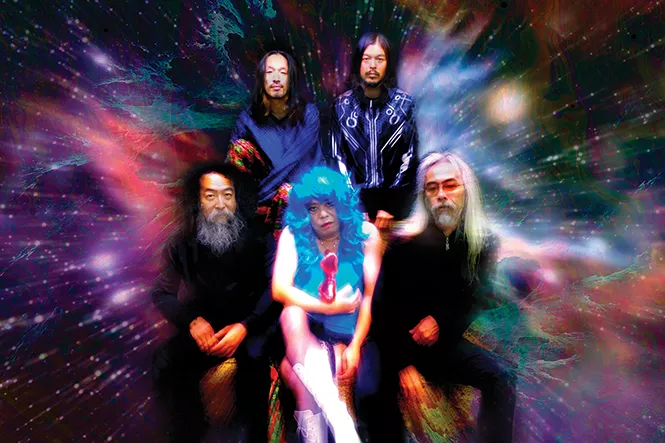
Osaka, Japan's Acid Mothers Temple is more than a rock 'n' roll band; it's an immense, free-floating, mind-blowing mothership of psychedelic sound, filtered through the sensibilities of Makoto Kawabata. When time and space are bent to the point of fracture, and split into a thousand glistening, crystalline shards, you wonder if he's channeling alien inspiration. Yet, in an email interview, Kawabata says it's not some extraterrestrial entity, but the cosmos itself, that's flapping its gums at him.
In a sense, Kawabata is the Japanese J. Mascis, with his long gray hair and beard, as well as his laconic tendencies. His replies are short and sometimes feel like non-answers that basically amount to, "the music speaks for itself." This is due partly to the language barrier, for which Makoto is, true to polite Japanese form, apologetic. "Sorry my bad English," he writes. "You can fix to right English."
Saying the music speaks for itself is fair enough, actually, with AMT's long history, extensive catalog and massive performances, such as those heard on the band's 2015 album Live in Castleton (Discos Mascarpone). Their sound morphs from free-jazz to psych-rock to acid jams to dreamy space sonospheres to electronic noise, giving the band an air of mystery—a fog-machine cloud that veils as much as reveals the compositions. Oddly, Kawabata's explanation of his music isn't as miasmic. "I receive music from my cosmos, that's all," he says. "It's never changed."
But it's not inaccessible; there's humor and reverence in it. This manifests on Castleton tracks like "Kick Your Ass in the Sky" and musical tributes to Pink Floyd and Miles Davis: "Shine on You Crazy Dynamite" and "Pink Lady Lemonade—Son of a Bitches Brew Theme," respectively. It's like they've combined all the tropes, visuals and verbals of the acid rock genre in a blender, with a smidgen of Kawabata's rural Japanese upbringing listening to radio, absorbing all that circulated through his auditory canal.
Additionally, his aim isn't as esoteric as you'd think. In spite of AMT's apparent proclivity for weirdness, he wants the same audience rapport as any other band. "If we play as best as possible," he says, "people can feel and receive something from us, even if they are not interested in our music."
Kawabata founded the Acid Mothers Temple Soul Collective in 1995. They released their self-titled debut on the Japanese label PSF Records and made the influential U.K. publication The Wire's list of 1998's best albums. From there, the ensemble became a musical family—as in the Source Family, only without the cult. It evolved into a variety of configurations and side projects producing variations on the AMT theme. Kawabata says the band's motto is, "Do whatever you want; don't do whatever you don't want!"
That's how he wound up with umpteen iterations of AMT, including Acid Mothers Temple & the Cosmic Inferno, Acid Mothers Temple & Space Paranoid, Acid Mothers Gong, Acid Mothers Guru Guru and Acid Mothers of Invasion. Last but far from least is Acid Mothers Temple & the Melting Paraiso U.F.O., the main mothership of the Collective, which lands in Salt Lake City on May 7. The combined discography of AMT and its offshoots numbers more than 80 releases. If you count the band's live albums, compilations and Kawabata's side- and solo projects, that number is much higher. Kawabata keeps busy, always touring at least one of these projects.
He says the key to such prolific output is letting the music flow. "Music should be improvised because with different times, places and people, it's impossible to see the same situation," he says. "Music is in the moment. When I play music, my mind and head are totally nothing. Nothing is everything."
Acid Mothers Temple is a trip and a half; their inventiveness and sheer musicianship is reminiscent of the Mothers of Invention under Frank Zappa's leadership. Their shows have a ritualistic aspect, like entering the temple of an arcane religion whose actual beliefs are coded in some secret language comprised of vibrations and spherical mathematics. You really don't know where you're going with an AMT song. A guitar melody begins with a delicate and varied arpeggio pattern, evoking pastoral scenes, then gradually increases in tempo, adding instruments in layers until the song almost levitates you. It's a kind of alien invasion—non-threatening but still scary, like a conduit to a higher dimension ought to be.
The danger with Acid Mothers Temple isn't that you'll try to take in so much of their musical cosmos that it becomes overwhelming; it's that you might try to read too much into it, from all the glyphs and totems and hints the music provides. Kawabata prefers his listeners take his music simply. "It's just music," he says. "We wanna make people happy—that's all."